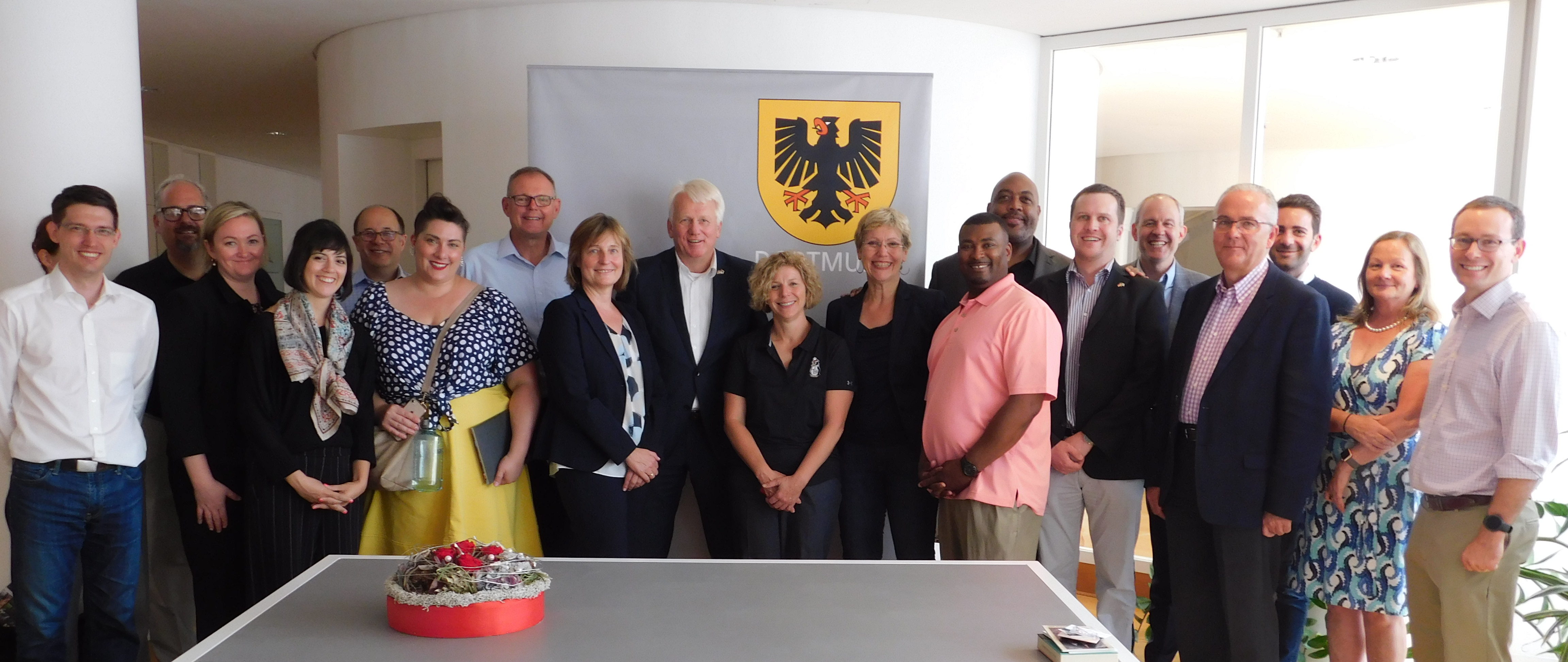 From June 30 to July 6, as part of the ACG’s Transatlantic Cities of Tomorrow: Digitalization and the Future of Work initiative, a 16-person delegation including education specialists, information technology experts, and representatives from economic development organizations, incubators, and city government, completed the reciprocal exchange to Berlin, Dortmund, and Darmstadt building on their experiences from their U.S. trip in May.
From June 30 to July 6, as part of the ACG’s Transatlantic Cities of Tomorrow: Digitalization and the Future of Work initiative, a 16-person delegation including education specialists, information technology experts, and representatives from economic development organizations, incubators, and city government, completed the reciprocal exchange to Berlin, Dortmund, and Darmstadt building on their experiences from their U.S. trip in May.
The participants in the exchange came from the cities of Cleveland, Youngstown, and Pittsburgh in the United States and the regions of Dortmund and Darmstadt in Germany. Representing the first round of four reciprocal exchanges for thought-leaders in small- and medium-sized cities in Germany and the U.S., the delegation sought to examine solutions to common challenges resulting from digitalization and to identify innovative approaches to turning these challenges into opportunities for their local workforce and economies.
Beginning in Berlin, the group had opportunities to learn about digitalization and innovation policies and Industry 4.0 initiatives being supported at the German federal government level with representatives from the Bundesverband der Deutschen Industrie (BDI) / Federation of German Industries and the Bundesministerium für Wirtschaft und Energie / German Ministry of Economics and Energy. At a luncheon hosted by Bitkom and the Deutscher Städte- und Gemeindebund / German Association of Towns and Municipalities, the delegation learned about the state of digital infrastructure and smart city developments at the local level in Germany. Marja-Liisa Völlers, a member of the German Bundestag and Vice-Chairwoman of the Enquete Commission on “Vocational Education in the Digital Workplace”, shared the challenges of modernizing the educational system throughout Germany.

The two-day visit to Dortmund focused on education and workforce development, beginning with visits to the IHK zu Dortmund / Chamber of Industry and Commerce and the Handwerkskammer Dortmund / Chamber of Handicrafts to gain a deeper understanding of the German dual system of apprenticeship training and efforts to address digitalization in terms of new career fields and reforming existing training occupations. Through visits at the Robert-Bosch-Berufskolleg and the Heisenberg Gymnasium, the delegation observed creative and hands-on teaching approaches that allow students to gain technical and digital skills. The group marveled at the STEM projects young people work on at KITZ.do – Technology Center for Young People and Children, where 8- and 10-year old children, for instance, design sustainable cities and airports, helping them awaken their curiosity and enthusiasm for science and technology.
 In Dortmund, the delegation also had the opportunity to learn about the city’s structural transformation from a region focused on the steel and coal industries to one focused on new technologies and sustainability with a visit to the PHOENIX See (a former steel factory turned into a lake), a meeting with Dortmund Mayor Ullrich Sierau, and a discussion on entrepreneurship and startups at the Centrum für Entrepreneurship & Transfer (CET) at TU Dortmund with presentations from local startup firms Motionminers and doks.innovation.
In Dortmund, the delegation also had the opportunity to learn about the city’s structural transformation from a region focused on the steel and coal industries to one focused on new technologies and sustainability with a visit to the PHOENIX See (a former steel factory turned into a lake), a meeting with Dortmund Mayor Ullrich Sierau, and a discussion on entrepreneurship and startups at the Centrum für Entrepreneurship & Transfer (CET) at TU Dortmund with presentations from local startup firms Motionminers and doks.innovation.

The week concluded with a visit to Darmstadt, which has been recognized with numerous awards for being a digital city. Visits included the Fraunhofer Institute for Structural Durability and System Reliability (LBF) to learn about their work on smart and lightweight structures, future mobility, and digital solutions, and the Learning Factory – Mittelstand 4.0 Competency Center at the TU Darmstadt that highlighted how competencies are taught in a real production environment. The delegation also met with Darmstadt Mayor Jochen Partsch and the city government team responsible for the smart city strategy and initiatives, Digitalstadt Darmstadt. The visit to Darmstadt finished with a visit to HUB.31 and a roundtable discussion on innovation, start-ups, and commercialization strategies for new technologies in the digital field with HTAI / Technologieland Hessen, the IHK Darmstadt, and INI-Novation.

Following the reciprocal exchange, the participants in each city are now in the process of identifying concrete ideas of projects that could be undertaken in their home communities, or in collaboration with their partner city, based on lessons learned during the program. These will then be developed into action plans to continue the engagement of everyone and to help ensure that there is a tangible impact from the exchanges in the participating communities.
The next round of reciprocal exchanges will take place in September and November and will include Charlotte, Knoxville, and Nashville in the United States, as well as Leipzig, Halle, and Magdeburg in Germany.
Transatlantic Cities of Tomorrow: Digitalization and the Future of Work is organized and administered by the American Council on Germany with generous support from the Transatlantic Program of the Government of the Federal Republic of Germany through funds of the European Recovery Program (ERP) of the Federal Ministry of Economics and Energy (BMWi). This project is also administered under the auspices of the Deutschlandjahr USA 2018/19 – Year of German-American Friendship.


